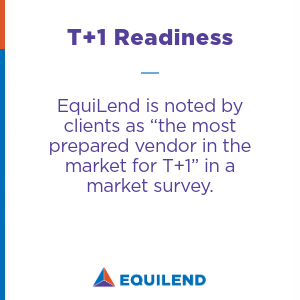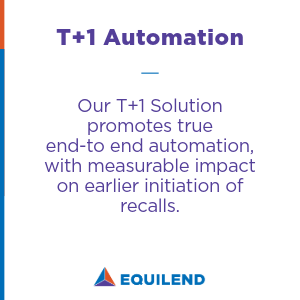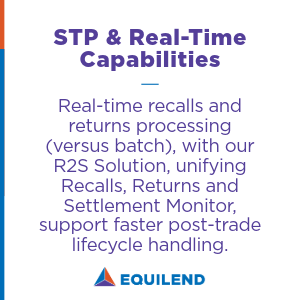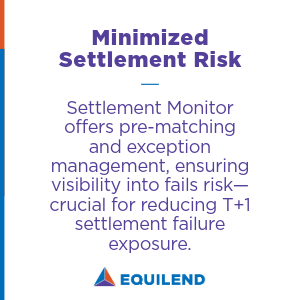Insight
Oct 2025
Gabi Mantle
EquiLend Update on the UK and European T+1 Reports and Recommendations
Recap
The UK Accelerated Task Force for T+1 published its draft recommendations on September 27, 2024, which will be central to an effective T+1 settlement launch in the UK. These recommendations for T+1 in the UK consider some of the lessons learned from the May move to T+1 settlement in North America, Argentina and Jamaica. In Q3 2025, the UK AST aligned their recommendations with the EU working group to include automations of returns as a core recommendation. Prior to this only recalls automation was included in the UK AST recommendations. We’ll continue to bring you updates from the working groups here, as they are released.
Market Intelligence
The ambition for increased market efficiency is a shared aim in the UK and Europe going forward. Simon Waddington, Global Head of Post-Trade Solutions at EquiLend, commented:
“It is fantastic to see automation called out as an overarching requirement for the ultimate success of T+1 in the UK. The observation in the Draft Report that manual resource should only be a short-term work-around is astute and has been at the heart of the difficulties some firms reported in the recent Citi report on T+1 implementation.”
For securities finance, streamlining the recalls notification and workflow process was a common theme in North America pre-T+1 and one that has continued in our UK and European client conversations.
In analyzing recalls behavior in the U.S. and Canada since their shift to T+1 in May 2024, we found that market participants were issuing the bulk of their recalls ever earlier in the U.S. workday, but we also saw recalls notifications processed throughout the day and the evening. Our hypothesis is that processes began to shift to real-time, starting on T+0 rather than being processed in batch in the morning on T+1.
In some instances, we believe recalls processing is being covered by global teams rather than solely in the North America region; automation is facilitating a smooth hand-off between teams along with round-the-clock recalls issuance, in line with the guidance for the UK.
The June 2025 “High-Level Roadmap To T+1 Securities Settlement in The EU” report from ESMA emphasises continued alignment for EU member states, and many of the recommendations are also aligned to the UK planned transition including trade affirmation on T0.
Market Reaction - AST and ESMA Reports
Of the recommendations emerging from the technical Stock Lending sub-workstream, part of the Trading and Liquidity Workstream, there are two key recommendations that we consider most important for the execution of T+1 in the UK, with notable highlights in other workstreams.
Stock Lending Workstream:
- SFT 01: ‘Automation of stock lending recalls’ changed in Sept 2025 to ‘Automation of securities lending recalls and return instruction flows’.
- UK – SFT 02: Market cut off for stock lending recalls and return settlement deadlines – The market expectation is that borrowers will make every effort to satisfy the recall on T+1 even if the recall is issued by the lender post 16:00 UK time on T+0 and not default the return to T+2’.
Market Cut-Off Enforcement – The enforcement of the market cut-off within the current proposals from the UK Taskforce would see the UK recalls cut-off set to 16:00 p.m. GMT / 11:00 a.m. EST,
- EU – SF 05: Automation of securities lending recalls and return instruction flows. Promote automation of securities lending recalls and return instruction flows using electronic messaging with defined data standards.
Other Workstreams:
- LEL 03.00 UK T+1 Process automation
- Principle Recommendations – Static Data
- Additional Recommendations – Environmental
The June 2025 “High-Level Roadmap To T+1 Securities Settlement in The EU” further supports the standardization of the recalls and returns deadlines in line with the AST recommendations.
Recalls & Recalls Automation
The UK AST T+1 Report included recalls automation in the draft recommendations. The UK Implementation Plan for First Day of Trading for T+1 Settlement paper further recommends the automation of lending recall processes by the end 2026. Deemed a critical action and based on learnings from regions that are already operating on T+1, the recommendation aims to ensure the smoothest implementation possible for the UK and Europe Common throughout the report is the need for greater automation across the post-trade lifecycle, not only the named automation of recalls.
We have seen a hugely positive reaction from our clients with the 2024 launch of a fully reimagined Recalls & Returns Notification and Workflow tool – a complete workflow for distributing and receiving recalls, with seamless integration with the wider EquiLend ecosystem via real-time messaging, allowing for complete system to system automation. These enhancements to our post-trade ecosystem were, in part, an innovation driven by our clients’ shared concerns as they looked to prepare for the shift. Initially created with the T+1 shift in the U.S. and Canada in mind, our T+1 solution was fully embraced by clients, as evidenced by the 176% increase in recalls volumes on our platform in the first week following the implementation of T+1 in North America and Canada. Since May 2024, we have seen a 44% uplift in recalls automation on our recalls platform.
Recalls relationships on platform have continued to increase since May 27, and we’ve doubled the number of participants interreacting together on platform in that time. This increase in relationships creates an ever more global, interconnected network of market participants all facing the same challenges of time and information accuracy.
Market Cut-Off Enforcement
Whilst we welcome the inclusion of setting and enforcing market cut-off for UK recalls, our solutions are built to handle recalls and returns on a real-time basis 24/7, so we are agnostic to any deadlines. As a lesson learned from the U.S. and Canada, agreeing these deadlines well in advance of the move to T+1 is paramount to avoid the last-minute back and forth experienced in late May.
The enforcement of the market cut-off within the current proposals from the UK Taskforce would see the UK recalls cut-off set to 4:30 p.m. GMT / 11:30 a.m. EST, leaving very little time for U.S.-based borrowers or lenders to address lifecycle events within T+1 for the region they are trading in. These U.S.-based market participants will have to consider their unwinds almost before they have booked a trade. The rulesets available within automated recalls tools ensure that recalls are managed as intended, day or night, leaving only exceptions-based resolutions to be prioritized by the back office.
Without automation and digitization as standard, it will become impossible to react quickly enough to accommodate borrow/loan trade needs and manage post-trade lifecycle events in the appropriate timeframe, both of which pose a threat to global liquidity, the mission at the center of the securities finance sector.
SSI Automation
Further to recalls automation and cut-off enforcement, we both welcome and support the inclusion of the recommendations of the Static Data and Environmental Recommendations to prioritize digitized SSI management and Digital KYC.
The UK Implementation Plan for First Day of Trading for T+1 Settlement paper also recommends the inclusion of corporate actions and SSIs and notes that firms do not need to wait until 11th October 2027 to comply with T+1 settlement.
EquiLend Enhanced SSI, powered by our partners at SSImple, provides SSI pre-matching, enrichment, management and secure storage and sharing of SSIs. The combined automation of recalls and SSIs are a powerhouse for meeting the challenge of T+1 in the UK head on.
Recommendations from the Financial Markets Standards Board (FMSB), in a separate set of recommendations, additionally address the treatment and management of SSIs. No conversation on a seamless transition to T+1 in the UK would be complete without the inclusion of SSIs. Often overlooked, poor SSI management presents significant challenges in a T+1 settlement scenario, where T+1 trade settlement would easily be threatened by the persistence of inaccurate SSIs.
ESMA’s June 2025 High-Level Roadmap To T+1 Securities Settlement in The EU, also echoes the need for greater automation and standardized electronic communication of SSIs to support the elimination of manual processing delays in the T+1 Transition for Europe and the UK. standards for SSI management and exchange.
The final hurdle in a smooth T+1 for the UK is in the imperative need to digitize KYC, per the additional environmental recommendations from the AST Technical Working Group Draft Report and Recommendations. Digital KYC will ensure the removal of bottlenecks which delay and restrict additional liquidity from entering the securities finance market. EquiLend Onboard+ supports borrowers and lenders in document sharing, storage and management, ensuring client onboarding time is reduced by up to 90%.
Without supporting the recommendations for firms to automate these processes, T+1 will not be operationally viable for the UK. Greater automation throughout the securities lending lifecycle in pre-trade, execution and post-trade ensures greater accuracy and speed for both sides of the trade. It protects liquidity, minimizes breaks and ensures compliance, globally. With elevated interest rates, and multiple layers of regulatory reporting each with their own respective requirements, fails have never been more expensive.





